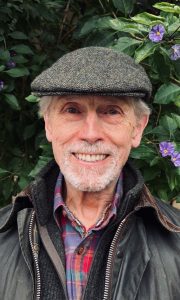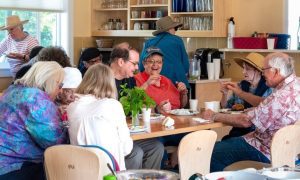They say from little acorns great oak trees grow, and few know that better than Glen Park’s Nicholas Dewar, who has spent the last 12 years plotting the future of the Greenway, oak by oak.

Now the 17-year resident of Glen Park has his eye on a bigger project: nurturing the first senior cohousing network in the city.
“Seniors have needs that go way beyond grab-bars and memory exercises” says the 74-year-old Dewar, who is leading an initiative to create senior cohousing in San Francisco.
“To stay healthy, we need to avoid isolation. The best antidote to isolation is community; the best way to ensure community is to build community around us and that’s what cohousing does. In cohousing, community is built-in.”
Dewar and others are forming a core group of potential future residents, launching the process with a free workshop in San Francisco on January 22.
“Aging Successfully … what does that really mean?” will be an opportunity to explore ideas and connect with others who are asking the same big questions about aging and living well. Those who are interested will be invited to join a ten-week series of meetings to delve further into these questions and consider the benefits of developing senior cohousing in San Francisco.

Cohousing is an innovative housing model that started in Denmark in the 1960s and, since the late 1980s, more than 150 cohousing projects have been established in the United States.
In the Bay Area cohousing first appeared in Emeryville in 1992 and now there are seven cohousing projects in Alameda and Contra Costa counties: five are up and running and two are in formation.
Although these cohousing projects are mostly for households of any age, cohousing is very well suited to seniors because its fundamental structure so effectively addresses the well recognized scourge of old age: isolation.
The structure includes relatively compact individual homes with substantial shared facilities, a design that produces inevitable interaction with other residents, a size limited to 20-30 households, and a collaborative organization for management and maintenance of the entire project.
This fosters a strong sense of community that is normally reinforced with frequent and regular shared meals as well as co-care agreements.
Despite its reputation for innovation, San Francisco has no cohousing project.
The high costs of real estate and construction, zoning provisions, local pressure to prevent residential development — especially high-density projects — and local government reluctance to step up and respond substantially to demands for more housing are large barriers to cohousing projects.
Dewar believes that changes to state and local legislation as well as some disruption to the local political environment in the latest elections “seem to have improved the conditions so, this time, we have a good chance to really get a senior cohousing project built.”
More information about the workshop on Wednesday, January 22, 5:30 to 7 p.m., is available at sfcohousing.com where those who wish to attend can register.
The workshop will be held at 3512 16th Street (a six-minute walk from the Castro Muni station). There is no charge to participate, but prior registration at sfcohousing.com is requested.